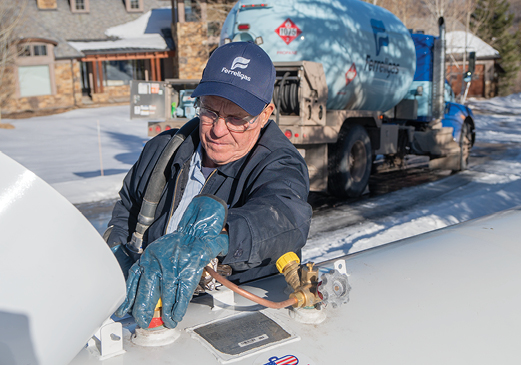Can propane freeze?
As we make our way through the coldest season of the year, many propane users find themselves wondering one thing: can propane freeze? Given that propane is stored in a liquid form, that’s a reasonable concern to have. And while the answer is technically yes, it can freeze, it is very unlikely that it will happen.
Under pressure inside the tank, propane exists in a liquid state. As the liquid leaves the tank, it reaches -44 degrees, at which point the propane boils and vaporizes to a gaseous state ready for use in your appliances and heating systems. Large pressure changes may lead to increased icing on storage tanks, regulators, and valves.
You may not be able to control the weather, but there are steps you can take to ensure your propane system works without interruption even in the harshest conditions.
What is Propane’s Freezing Point?
Propane gas has an impossibly cold freezing point of -306° Fahrenheit — more than 200 degrees colder than the United States average winter temperatures of 15°F to 25°F. While laboratory studies have successfully frozen propane under induced conditions, the gas itself is unlikely to freeze in a real-world application.

Why is my Propane Tank Freezing?
Under extreme conditions, the components that store, move, and regulate propane from an outside tank to your home’s furnace and appliances may be affected by frost and ice forming on cylinders, regulators, and delivery lines. However, it is highly unlikely.
Most instances of “freezing” occur on pressure regulators, where the propane’s pressure is reduced to a level usable by appliances and other equipment. As liquid propane expands to a gas form and reaches its boiling point, it commonly freezes the humidity around the regulator. A small amount of frost or ice forming tank equipment could be considered normal, but large amounts of thick ice requires help from a propane professional.
How to Keep a Propane Tank from Freezing
Incorporating a handful of preventative measures can go a long way in protecting your propane tank during the cold winter months. Here are a few simple tips to keep in mind:
-
Maintain a refill schedule. By keeping your tank no less than one-quarter full, you reduce the risk of running out of propane during extreme weather events. Automatic refill services like Ferrellgas’ Auto Fill program will give you peace of mind all winter long.
-
Limit unnecessary pressure. Maintaining tank pressure is essential to consistent performance, and making simple changes, such as turning down your thermostat, can help you avoid low pressure.
-
Keep snow and ice off your tank. Leaving a layer of snow or ice on your tank may seem harmless enough, but the added weight could damage fittings and joints, leading to preventable leaks.
Attempts to de-ice tanks or systems with flames or water are not recommended. To ensure your tank is well-positioned for top performance and safety, we recommend familiarizing yourself with standard propane tank safety measures.
Ferrellgas is Here to Help
For generations, propane has proven to be a clean, effective, safe, and trouble-free fuel for a variety of home and industrial applications — even in the most extreme weather conditions. To learn more about how to make sure your propane system is ready for the worst winter can deliver, visit the Propane 101 website.
If you suspect your system isn’t working properly, contact Ferrellgas. A trained professional will inspect your tank and other components to ensure they’re in good working order.
CATEGORIES
Archives
- Summer 2025
- Spring 2025
- Winter 2024
- Fall 2024
- Summer 2024
- Spring 2024
- Winter 2023
- Fall 2023
- Summer 2023
- Spring 2023
- Winter 2022
- Fall 2022
- Summer 2022
- Spring 2022
- Winter 2021
- Fall 2021
- Summer 2021
- Spring 2021
- Winter 2020
- Fall 2020
- Summer 2020
- Spring 2020
- Winter 2019
- Fall 2019
- Summer 2019
- Spring 2019
- Winter 2018
- Fall 2018
- Summer 2018
- Spring 2018
- Winter 2017
